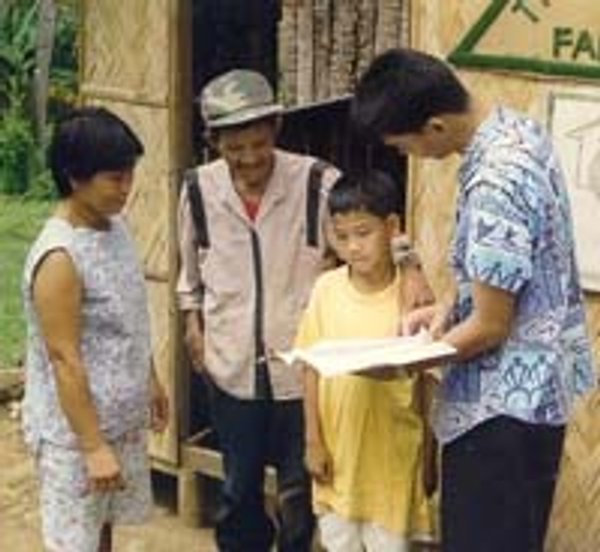Felino Lucero braced himself for the worst. The fourth among seven children, his father could no longer afford to send him to the town school the next year. He was just 13 and still a long way from his dream of helping his family escape from poverty.
At that time in 1988, the first Family Farm School was being set up in a district called Dagatan, in Lipa City, Batangas, some 12 kilometers from the Lucero home. By word of mouth, Felino's father Rodolfo had found out about the new agricultural school. Since the family's income came solely from tilling a small piece of land for rice and vegetables, the prospect interested him. Having learned that the students of Dagatan Family Farm School would be virtually on full scholarship, Rodolfo saw this as the answer to his prayers. His son Felino might not have to stop schooling after all.
Helping small farmers

Dagatan is the first school of its kind in the country and in Asia. It has a system distinct from any private or public educational institution in the Philippines. Students go through a year-long cycle of one week in school and two weeks on their family's farm. To be admitted into the three-year high school curriculum, the candidate has to be an elementary school graduate. His family should have a small parcel of land and his parents should be willing to be actively involved in the teaching system of the school.
After passing the entrance examinations and interviews, Felino joined the first batch of Dagatan students. With 35 others, he moved into the new school that occupies a 1.5-hectare farm, donated by the Ayala Corporation. The school is small but complete, with a laboratory, library, classrooms, dormitory, workshop, offices, living room, chapel, basketball court, volleyball court, and a soccer field.
The first week of study was intense. Since they spend one week in school and two weeks on the farm, the students’ time is maximized: classes start at 6:00 a.m. and end at 7:30 p.m. For that week the students are full-time boarders in the school. Besides all the regular high school subjects, the curriculum includes classes in agricultural technology, agricultural mechanics, cooperative ventures, farm accounting, farm marketing and management, computer technology and typing.
After the school week, Felino and his classmates would go home to their family farms. They would bring with them assignments that had to be completed during the next two weeks. They would apply what they learned in school, study particular crops, interview their parents and other community members, visit government offices and banks and, naturally, help in farm chores. A tutor assigned to the student would visit the family to discuss the assignments and talk to the student and his parents.
After three years of intense work, Felino proudly marched down the aisle during Dagatan's first graduation ceremonies in 1991. As of now, he has become a respected farmer-manager and is recognized as the community "consultant" on hog raising and hog waste management.

Dagatan’s growth
Soon after the school started, the students’ parents formed the Dagatan Association to raise funds for the school. The Association has built up a modest fund through its activities and is now providing significant assistance for the school's operating expenses. It is also assisting Dagatan families to establish small agricultural and livelihood projects to build family income.
In the 2002-2003 school year, the Association established a farm to raise hogs that will be distributed among the families. The benefits of this project are spread among the Association and the school. The farm also produces methane gas utilized for the needs of the kitchen.
In the coming year, Dagatan expects to be able to expand the farm to benefit more area farmers and to produce more methane gas, so that the school’s electricity needs will also be covered. Also a cooperative will be set in motion to combine efforts in the cultivation and processing of agricultural products.

Fertile ground for Family Farm Schools
The history of the family farm schools began in 1983 when Fritz Gemperle, a Filipino executive involved in agriculture, was attending an international seminar in Spain. There he met some members of Opus Dei who were involved in a unique type of agricultural school that had proved successful in developing the rural countryside. In addition to technical education, the schools offered personal and professional formation imbued with the a Christian spirit, based on the teachings of Saint Josemaría Escrivá. Over the next four years, Fritz and some friends studied the family farm schools in Spain, and in 1987, launched a Filipino version.
The project was well-received by all: the government, corporate and individual donors, tutors, farmers and students. Dagatan Family Farm School was inaugurated in 1988. Fifteen years later, five more schools are in operation, helping increase the number of farmers who have received at least a high school education.
Private groups that have helped with the family farm schools include: the Marubeni Foundation, DuPont Philippines, Ay Foundation, Metrobank Foundation, Makati Garden Club, and Silver Lending Investors. The Department of Education and the National Agriculture and Fisheries Council of the Department of Agriculture have also assisted.
Those who want more information or wish to make a donation can contact Dagatan at:
www.familyfarmschool.zibyschool.com
